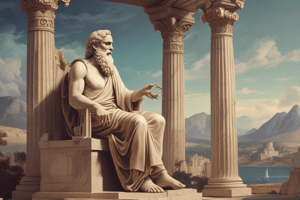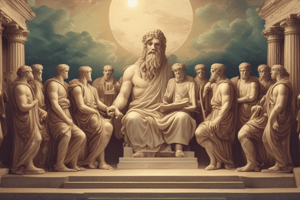Podcast
Questions and Answers
What did Socrates believe about the soul?
What did Socrates believe about the soul?
- The soul should not be cared for.
- The soul is immortal. (correct)
- The soul is the same as the body.
- The soul is a temporary entity.
Which part of the soul, according to Plato, is responsible for rational thinking?
Which part of the soul, according to Plato, is responsible for rational thinking?
- The appetitive part.
- The spirited part.
- The emotional part.
- The rational part. (correct)
According to Socrates, what is the primary task of philosophy?
According to Socrates, what is the primary task of philosophy?
- To ensure societal stability.
- To care for the soul. (correct)
- To gain popularity among peers.
- To acquire wealth and power.
Plato describes the appetitive part of the soul as concerned with what?
Plato describes the appetitive part of the soul as concerned with what?
What is the ultimate goal of life as stated by Socrates?
What is the ultimate goal of life as stated by Socrates?
How does Socrates view the relationship between the soul and the body?
How does Socrates view the relationship between the soul and the body?
What does Plato suggest is needed to govern the appetitive and spirited parts of the soul?
What does Plato suggest is needed to govern the appetitive and spirited parts of the soul?
What does Socrates imply about virtue and happiness?
What does Socrates imply about virtue and happiness?
Which aspect of the self does St. Augustine emphasize?
Which aspect of the self does St. Augustine emphasize?
What significant claim does Rene Descartes make about the immaterial soul?
What significant claim does Rene Descartes make about the immaterial soul?
How does David Hume's view differ from Descartes' perspective on knowledge?
How does David Hume's view differ from Descartes' perspective on knowledge?
Which philosopher is known for the idea of the self as a tabula rasa?
Which philosopher is known for the idea of the self as a tabula rasa?
What is Immanuel Kant's concept of the self primarily focused on?
What is Immanuel Kant's concept of the self primarily focused on?
What aspect characterizes the appetitive part of the soul according to Plato?
What aspect characterizes the appetitive part of the soul according to Plato?
What methodology is Descartes known for that involves doubting all prior beliefs?
What methodology is Descartes known for that involves doubting all prior beliefs?
According to St. Augustine, what is the soul meant to engage with?
According to St. Augustine, what is the soul meant to engage with?
Flashcards are hidden until you start studying
Study Notes
Socrates
- Greek philosopher whose teachings were documented by his student Plato and the historian Xenophon
- Developed the Socratic Method which involved questioning everyday views and popular Athenian beliefs
- Believed that the soul is immortal and that philosophy is the care of the soul.
- Argued that virtue is necessary for happiness and famously stated "The unexamined life is not worth living."
- Emphasized the importance of turning inward and analyzing the values guiding one's life, believing that the state of one's soul determines the quality of their life.
- Believed that existence is of two kinds: the visible and the invisible.
- Stated that the body is a slave to the soul, which holds the position of ruler and master.
- Considered the goal of life to be happiness, achieved through virtuous living.
Plato
- Student of Socrates who wrote the Socratic Dialogue.
- Believed the soul has three parts:
- Appetitive (Sensual): Enjoys sensual experiences like food, drink, and sex.
- Rational (Reasoning): Forbids enjoyment of sensual experiences and prioritizes truth. This part should rule over the others through reason.
- Spirited (Feeling): Inclined towards reason but understands the demands of passion, valuing honor and victory.
St. Augustine
- Also known as Saint Augustine of Hippo and considered one of the most significant Christian thinkers.
- Believed the human being is both soul and body.
- Believed that the body possesses senses (imagination, memory, reason, and mind) through which the soul experiences the world.
- Described aspects of the self/soul:
- It is self-aware.
- It recognizes itself as a unified whole.
- It is aware of its unity and is meant to "tend to higher, divine and heavenly matters."
Rene Descartes
- French philosopher, mathematician, and scientist often referred to as the father of modern Western philosophy.
- Employed hyperbolic or metaphysical doubt, also known as methodological skepticism.
- Famous for the statement "Cogito ergo sum" (I think, therefore I am), which emphasizes the importance of self-awareness and the existence of the thinking self.
- A fierce rationalist, he believed in a mind-body dualism.
- Believed that the self (soul) is constant, unchangeable, and unaffected by time.
- Argued that only the immaterial soul remains the same throughout time and is the source of our identity.
John Locke
- Philosopher and physician who expanded Descartes' concept of the self as a thinking thing.
- Famous for the idea that the human mind at birth is a tabula rasa (blank slate), meaning knowledge is derived from experience.
- Emphasized the concept of accountability, which is linked to the idea of a self that is a product of its experiences.
David Hume
- Scottish philosopher, economist, and historian known for his opposition to Descartes' rationalism.
- Advocated empiricism, believing all knowledge is derived from human senses.
- Proposed the bundle theory, which suggests the self is a collection of different perceptions moving rapidly and successively.
- Distinguished between impressions, which are direct sensory experiences, and ideas, which are thoughts or memories derived from impressions.
Immanuel Kant
- Believed the self is transcendental and plays a crucial role in organizing information.
- Believed the self is comprised of an inner and outer self.
- Used the term apperception to describe the self's ability to unify and integrate different experiences.
- Proposed that the self organizes information in three ways:
- Raw perceptual input
- Recognizing the concept
Studying That Suits You
Use AI to generate personalized quizzes and flashcards to suit your learning preferences.




